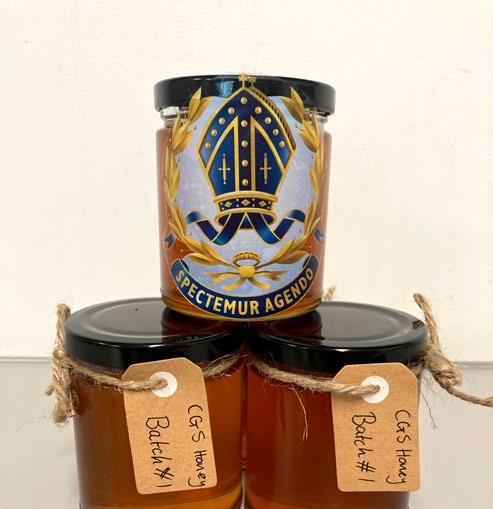
2 minute read
Green Pages
Bees
Honey bees are incredible little animals and have been close to people’s hearts for thousands of years. In fact, honey was found in an ancient Egyptian tomb and at over 3,000 years old, it was still yet to pass its used by date. Bees travel up to 1.5 km from their hive to collect pollen and in doing so pollinate more than 70% of the food we eat. They are amazing engineers and actually evaporate water out of the nectar with good, old fashioned elbow grease, beating their wings at 230 flaps per second (FPS) next to the open cells until the water content falls to 17%, after which the cell is capped with wax. Bees are also facing grave threats around the world from pesticides and urbanisation – but in our own small way, we are working to be a part of the solution.
Camberwell Grammar recently took several thousand new inhabitants in the form of honey bees (Apis melifera) who now reside in their hive on a private balcony on the third floor of the Wheelton Centre. This is an initiative set up by Towards2050, the school’s sustainability group and has been providing an amazing learning experience for our students in the upkeep, importance and general understanding of bees.
Not to mention 10 kilograms of honey in our first harvest.
Students and teachers alike can safely view them through a window while some of the Towards2050 students have been out in bee suits with a professional apiarist to make sure the bees are healthy and safe, as well as watching the apiarist collect the honey from the hive. Hopefully, these lessons might inspire some to even take the step of getting their own hive in years to come.
The bees have been here for almost six months now and while they did not pay close attention to the lockdown, they can at least claim to have been productive as they made both honey and friends. The 24 jars of honey from our first harvest are being put towards a Sustainable Cooking Competition in Term 3, with weekly honey prizes! Keep your eyes on the Sustainability page on DEEDS for more details, and for your chance to win.
In the future we hope to integrate the beehive and bees into the curriculum for subjects such as science and commerce. We hope the bees will provide examples and information, in the same way our solar panels do (another Towards2050 initiative). In commerce we hope to set up an entrepreneur section of the course where we use the honey as the product and get the students to find ways to sell it as successfully as possible.
Setting up the beehive has been an incredible experience for all involved. We have been greatly helped by Peter and Jane at ‘Backyard Honey’, to whom we are extremely grateful. Working with a professional apiarist has taken out the stress, and left us only with the sweet, sweet taste of that wonderful honey. We can’t wait for you to have a chance to try it.
Mr Will Hone and
Henry Shirrefs (Year 8)













